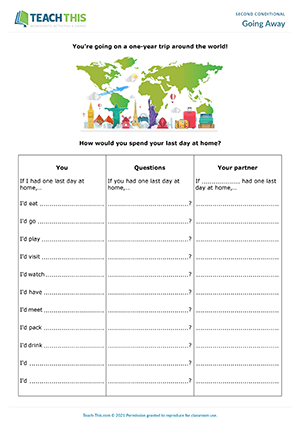Conditional Clauses Speaking Activities For Preschoolers

Conditionals: if - English Grammar Today - a reference to written and spoken English. People do sometimes use the form with would have in informal speaking, but many. If the kids are enjoying themselves, we just let them go on playing till they're ready for bed. (It is less likely or unlikely that we will get more students.).
Let me begin this blog post by saying that conditionals are not the easiest phenomenon to teach, especially since there are lots of combinations which are used in natural speech, but are not really covered in text books. Simulator krana kran simulator 2015 russian. After having shared with you my fun activities for the, I thought it was about time to move on to what is traditionally known as the 2nd conditional and suggest a few fun activities which practice the 2nd conditional.
First, let’s have a look at the form (keep in mind that there are many other forms not mentioned here). Form: If + simple past, would + base verb E.g. If we went by train, we would get there earlier. (Also possible: would+ base verb +if+ simple past) Meaning: Something reasonably possible but ‘ more tentative’. Past tense does not refer to past.
Here, it is likely that the train would take you to your destination faster. Stranded in a cave Tell your students that they are stuck in a cave. Put them in groups of four.
Give them different pictures or word cards with random items on them e.g. A chocolate bar, a chewing gum, a rope, a dog, a magazine, a plastic bag and so on. Each student has their own set of cards and each member of the group has different cards. Ask them to tell you how they would use these items in the cave. Would they also use them to get out of the cave?
Each group should decide on the two or three most necessary items. They should use the 2nd conditional when saying how they will use this. Consequence chain story A consequence chain is like writing a chain story but the learners must use the 2nd conditional and write about consequences (for more about this go h). How do you set this up?
Well, get your students to sit in rows. One student from each end of the room must write a sentence in the second conditional. Then, hand it to the student next to him/her. That student uses the previous student’s main clause to form an if clause, and then adds his/her own main clause and so on. Student A: If you arrived here early, you would meet Peter. Next student: If you met Peter, you would probably end up going on a date. Finish my sentence-Ball game If you have learners who like moving around, you should play this game.
One student stands in the front of the class and says half a conditional. The learner then throws the ball to a student and that student needs to finish off the sentence. You can even turn this into a team game where each student’s correct answer adds points to the team. This is great for the summer, you can play outside!
Let’s do some math Give your students math tasks and ask them to write down what they see. For example, If I had 3 cows and they produced 5 kilos of milk every day, how much milk would each cow produce? If scenarios Get your learners to talk or write about what they would do in each of these scenarios. You can jazz things up by getting them to draw pictures while doing so, like a little picture composition.
If I won 1 million euros, I would. If I had one day left to live, I would If I could fly anywhere in the world, I would. If I could choose any famous person to date, I would. You choose three students and give them three I.D cards ( you can make these cards up or you can use information about famous people).
You also choose a bachelor or bachelorette. The bachelorette/bachelor cannot see the three candidates. He/she asks questions like, ” What would you do if you were on a deserted island?” and the candidates need to answer using the 2nd conditional as well(if you press the title of this idea you can watch another teacher describing this game in more detail).
Let me begin this blog post by saying that conditionals are not the easiest phenomenon to teach, especially since there are lots of combinations which are used in natural speech, but are not really covered in text books. After having shared with you my fun activities for the, I thought it was about time to move on to what is traditionally known as the 2nd conditional and suggest a few fun activities which practice the 2nd conditional. First, let’s have a look at the form (keep in mind that there are many other forms not mentioned here).
Form: If + simple past, would + base verb E.g. If we went by train, we would get there earlier. (Also possible: would+ base verb +if+ simple past) Meaning: Something reasonably possible but ‘ more tentative’.
Past tense does not refer to past. Here, it is likely that the train would take you to your destination faster. Stranded in a cave Tell your students that they are stuck in a cave. Put them in groups of four.